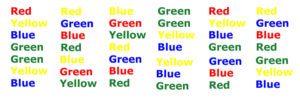Quick Hits
Daily brief research updates from the cognitive sciences

Last year I reported on how pollution and bad air in offices correlates with lower performance and productivity. Something business should take note of.
A study out of the University of Tsukuba has looked into decision-making under physical fatigue. Now this may seem to be off on a tangent and not related to the business world but they were specifically trying to look at what specifically clouds judgement under fatigue.
We know that when under fatigue, during or after strenuous activity, that so-called executive function decreases. Executive function is the ability to control impulses and control cognitive processes. One test of this is the Stroop test. The Stroop test flashes coloured words such as “red” but the text is either in the same colour or a different colour (e.g. red or red). If the text matches the text colour you click yes. If it doesn’t you click no.

This is tricky at the best of times and is often used as an executive function test in its own right.
When doing strenuous exercise, performance on this drops, often dramatically. The question now is, is it, because of attentional issues, a change in brain function to be able to exert yourself, or reduced oxygen?
The researchers devised an experiment whereby they were able to manipulate oxygen supply to the brain and thereby see whether it was just the oxygen levels that influenced this. And yes, when oxygen supply remained stable during exercise, performance on the Stroop test was influenced much less.
So, this shows that it is the oxygen supply that clouds judgment – or ability to deliver oxygen to critical executive regions of the brain.
That is important because that shows that oxygen supply to the brain is important for all decision-making in all conditions.
Take note businesses particularly those with those muggy meeting rooms where executives make critical decisions●

Andy Habermacher
Andy is author of leading brains Review, Neuroleadership, and multiple other books. He has been intensively involved in writing and research into neuroleadership and is considered one of Europe’s leading experts. He is also a well-known public speaker speaking on the brain and human behaviour.
Andy is also a masters athlete (middle distance running) and competes regularly at international competitions (and holds a few national records in his age category).
Reference
Genta Ochi, Ryuta Kuwamizu, Kazuya Suwabe, Takemune Fukuie, Kazuki Hyodo, Hideaki Soya.
Cognitive fatigue due to exercise under normobaric hypoxia is related to hypoxemia during exercise.
Scientific Reports, 2022; 12 (1)
DOI: 10.1038/s41598-022-14146-5
More Quick Hits
You Wake Up 100 Times Each Night – And That Helps Memory
Quick HitsDaily brief research updates from the cognitive sciences have written numerous posts and articles on sleep and the brain (review here), and the evidence is crystal clear. Good and consistent sleep is essential to all aspects of physical...
Only Three Factors Can Predict Mental Illness With 90% Accuracy
Quick HitsDaily brief research updates from the cognitive sciences here are multiple mental disorders that can afflict us human beings. And the assumption is that these are complex in nature and there are a multitude of paths to mental illness....
Cooperation Amongst Strangers Is On the Rise
Quick HitsDaily brief research updates from the cognitive sciences espite a belief in many that society is falling apart and becoming less caring and social this study proves the opposite. A study published by Yuan et al. with the American...
Brain Network For Social Attraction Identified
Quick HitsDaily brief research updates from the cognitive sciences umans do it. Birds do it. Fish do it. So do multitudes of other species. We flock together, come together, are attracted to our kind. We are a social species. But the question is...
The Brainwaves That Boost Creativity
Quick HitsDaily brief research updates from the cognitive sciences outlined here how recent research has shown that the brains of highly creative individuals use different networks, and this also reminded me of separate piece of research from a...
How Creative Brains Function Differently
Quick HitsDaily brief research updates from the cognitive sciences an you learn creativity? Well, you can learn anything, and you can certainly learn to be more creative. But the big question is do those people high in creativity have brains that...






